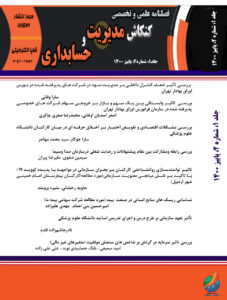مقاله: پژوهشی
صفحه: 302-285
نویسندگان:
امید سمیعی[1]، بابک جمشیدی نوید[2]، علی علی زاده[3]
[1] گروه حسابداری، واحد تهران جنوب، دانشگاه آزاد اسلامی، تهران، ایران
[2] گروه حسابداری، واحد کرمانشاه، دانشگاه آزاد اسلامی، کرمانشاه، ایران
[3] گروه حسابداری، واحد اسلام غرب، دانشگاه آزاد اسلامی، اسلام آباد غرب،ایران
چکیده
هدف این پژوهش بررسی تأثیر سرمایه در گردش بر شاخص های سنجش موفقیت (متغیرهای غیرمالی) م یباشد. در این پژوهش از 856 شرکت پذیرفتهشده در بورس اوراق بهادار تهران، تعداد 142 شرکت بهعنوان نمونه انتخابشده و قلمرو زمانی این پژوهش از سال 1390 تا 1394 انتخاب گردیده است. داده های جمعآوریشده برای آزمون فرضیه ها با استفاده از نرم افزار stata و Eviews و مدل لاجیت تابلویی به روش حداکثر راستنمایی استفادهشده است. فرضیه های این پژوهش تأثیر سرمایه در گردش خالص و سرمایه در گردش ناخالص بر شاخص های سنجش موفقیت (متغیرهای غیرمالی: حجم معاملات و دفعات معامله) شرکت ها می باشد. یافته های پژوهش حاکی از تأثیر مثبت و معنادار سرمایه در گردش خالص بر حجم و تعداد دفعات معامله و بی تأثیر بودن سرمایه در گردش ناخالص بر حجم و تعداد دفعات معامله میباشد. نتیجه نشان می دهد که وجود مناسب سرمایه در گردش می تواند شرکت ها را در جلب اعتماد سرمایه گذاران و تشویق آنها به سرمایه گذاری کمک کند. با توجه به یافته ها به مدیران شرکت ها پیشنهاد می شود که با دانستن نقش و کاربرد مهم سرمایه در گردش، می توان نقشی در تبیین بهبود عملکرد و رسیدن به موفقیت شرکت ایفا کنند.
کلمات کلیدی: سرمایه در گردش خالص، سرمایه در گردش ناخالص، شاخص های سنجش موفقیت، حجم معاملات، تعداد دفعات معامله.
Investigating the effect of working capital on success measurement indicators (non-financial variables)
Omid Samiei [1], Babak Jamshidi Navid [2], Ali Alizadeh [3]
[1] Department of Accounting, South Tehran Branch, Islamic Azad University, Tehran, Iran
[2] Department of Accounting, Kermanshah Branch, Islamic Azad University, Kermanshah, Iran
[3] Department of Accounting, West Islam Branch, Islamic Azad University, West Islamabad, Iran
Abstract
The purpose of this study is to investigate the effect of working capital on success metrics (non-financial variables). In this research, out of 856 companies listed on the Tehran Stock Exchange, 142 companies have been selected as a sample and the time domain of this research from 2011 to 2015 has been selected. The collected data were used to test the hypotheses using stata and Eviews software and the panel logit model using the maximum likelihood method. The hypotheses of this study are the effect of net working capital and gross working capital on the indicators of success measurement (non-financial variables: trading volume and number of transactions) of companies. Findings indicate a positive and significant effect of net working capital on the volume and number of transactions and the ineffectiveness of gross working capital on the volume and number of transactions. The results show that the proper existence of working capital can help companies gain the trust of investors and encourage them to invest. According to the findings, it is suggested to company managers that by knowing the important role and application of working capital, they can play a role in explaining performance improvement and achieving company success.
Keywords: Net working capital, Gross working capital, success metrics, trading volume, number of trades.
